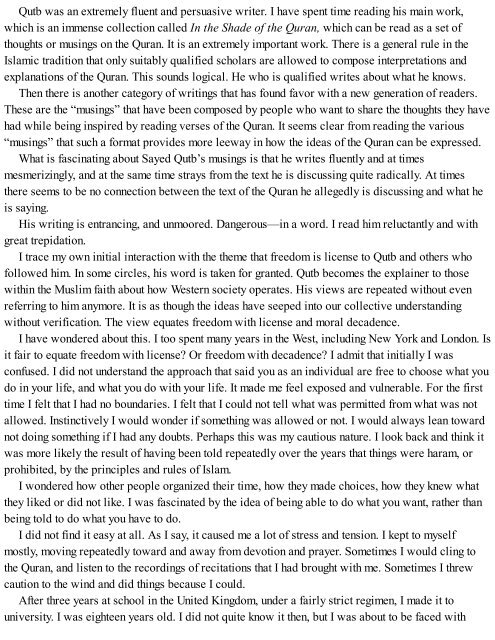1250119847
You also want an ePaper? Increase the reach of your titles
YUMPU automatically turns print PDFs into web optimized ePapers that Google loves.
Qutb was an extremely fluent and persuasive writer. I have spent time reading his main work,<br />
which is an immense collection called In the Shade of the Quran, which can be read as a set of<br />
thoughts or musings on the Quran. It is an extremely important work. There is a general rule in the<br />
Islamic tradition that only suitably qualified scholars are allowed to compose interpretations and<br />
explanations of the Quran. This sounds logical. He who is qualified writes about what he knows.<br />
Then there is another category of writings that has found favor with a new generation of readers.<br />
These are the “musings” that have been composed by people who want to share the thoughts they have<br />
had while being inspired by reading verses of the Quran. It seems clear from reading the various<br />
“musings” that such a format provides more leeway in how the ideas of the Quran can be expressed.<br />
What is fascinating about Sayed Qutb’s musings is that he writes fluently and at times<br />
mesmerizingly, and at the same time strays from the text he is discussing quite radically. At times<br />
there seems to be no connection between the text of the Quran he allegedly is discussing and what he<br />
is saying.<br />
His writing is entrancing, and unmoored. Dangerous—in a word. I read him reluctantly and with<br />
great trepidation.<br />
I trace my own initial interaction with the theme that freedom is license to Qutb and others who<br />
followed him. In some circles, his word is taken for granted. Qutb becomes the explainer to those<br />
within the Muslim faith about how Western society operates. His views are repeated without even<br />
referring to him anymore. It is as though the ideas have seeped into our collective understanding<br />
without verification. The view equates freedom with license and moral decadence.<br />
I have wondered about this. I too spent many years in the West, including New York and London. Is<br />
it fair to equate freedom with license? Or freedom with decadence? I admit that initially I was<br />
confused. I did not understand the approach that said you as an individual are free to choose what you<br />
do in your life, and what you do with your life. It made me feel exposed and vulnerable. For the first<br />
time I felt that I had no boundaries. I felt that I could not tell what was permitted from what was not<br />
allowed. Instinctively I would wonder if something was allowed or not. I would always lean toward<br />
not doing something if I had any doubts. Perhaps this was my cautious nature. I look back and think it<br />
was more likely the result of having been told repeatedly over the years that things were haram, or<br />
prohibited, by the principles and rules of Islam.<br />
I wondered how other people organized their time, how they made choices, how they knew what<br />
they liked or did not like. I was fascinated by the idea of being able to do what you want, rather than<br />
being told to do what you have to do.<br />
I did not find it easy at all. As I say, it caused me a lot of stress and tension. I kept to myself<br />
mostly, moving repeatedly toward and away from devotion and prayer. Sometimes I would cling to<br />
the Quran, and listen to the recordings of recitations that I had brought with me. Sometimes I threw<br />
caution to the wind and did things because I could.<br />
After three years at school in the United Kingdom, under a fairly strict regimen, I made it to<br />
university. I was eighteen years old. I did not quite know it then, but I was about to be faced with
















